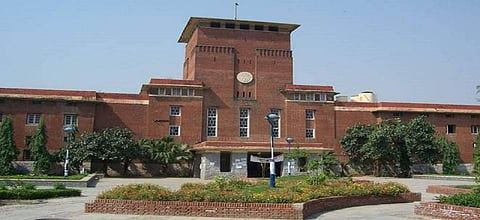

The Delhi University has still not decided whether to scrap the proposed revamped syllabi for the English, Political Science, History and Sociology or to implement it. The Executive Committee sent back the curriculum for further review under the supervision of an oversight committee and resubmission by the end of the month. But no committee has been formed nor have notifications been sent to the teachers about any such decision.
"We do not know what they expect us to do. We had made the changes that we could and then sent it back once. What they want from us is not clear yet," said Saikat Ghosh, a member of the Standing Committee, Academic Council and an Assistant Professor of English. "We are confused as to which syllabus to follow or what to teach the students. We will have a departmental meeting today to understand our role in this review. We have already removed what they wanted us to but we cannot entertain any further absurd modifications," he added.
The AISA organised a protest march from the Arts Faculty to condemn the recent syllabi debacle. "We strongly condemn the DU administration's action of encouraging ABVP's members to threaten the professors of English and History department and to disrupt the earlier held Academic Council meeting. Syllabus making is an independent academic exercise which requires deep engagement with the subject and involves wider consultation with all teaching members of the subject. The English department's newly proposed syllabus was designed by the joint efforts of over 120 faculty members in DU. The faculty members even agreed and proposed revised syllabus many times before the Academic Council and the Executive Counsel of Delhi University but the Vice-Chancellor, acting under the pressure of the RSS-backed teacher's wing and student's wing, has sent the revised syllabus back," said Kawalpreet Kaur, AISA President.
The ABVP State Secretary, Siddharth Yadav, said that their Satyagraha was for student representation in the Academic Council and it is unfortunate that student organisations are opposing the same EC's verdict that accepted all their demands. "They have their right to dissent. But they must know which side they are standing on. Dalit writers have been removed from Hindi novels, Babasaheb from Dalit Chintan, and here they are opposing our stand for inclusion. They can cry as much as they want but if the students read of Maoism, they ought to know the true colours of violence by the left ideology," he said.
The Students' Federation of India, in a statement, said that the right-wing communal forces working amongst the teacher and student community of the University of Delhi are in a fit of rage over the progressive content taught in some UG courses in the University. "The RSS, through their frontal organisations like the ABVP and the NDTF, have been attempting to tamper with the education curriculums. The hue and cry created over Ramanujan’s 300 Ramayanas and attempts by the Gujarat government to re-write the history of the Indian Independence movement based on lies propagated by the Sangh are a few examples. What has changed, however, since the Modi government has assumed power in the centre is that such attempts to destroy curriculums promoting critical ability and scientific temper and replacing it with RSS propaganda have got institutional backing," read the statement.
The AISA added that the attitude of the DU administration of reportedly acting at the behest of RSS speaks of the increasing control of these bodies in independent academic institutions. "For any university to survive, it is pertinent that academic freedom is given to its professors and critical thinking is developed in students," Kawalpreet added.
The English department had to drop the most controversial and debated short story "Maniben alias Bibijaan" by Shilpa Paralkar that spoke about a Hindu woman's connection with a Muslim man in the backdrop of the Godhra riots of 2002 and hinted that a character — a member of the Bajrang Dal — was associated with looting and burning an old Muslim man alive with his granddaughter. "We also had to drop an essay by Mukul Kesavan on a politically empowering government, Neha Dixit's award-winning reportage on mob-lynching. We had to get rid of all reference to Indian deities when it came to the section of the syllabus on Interrogating queerness — we are only trying to make the students engage with gender beyond the binary and we have had that in Indic civilisation since ancient times. The Ardha-Nariswar avatar of Shiv is the best example of gender fluidity," said Saikat. "But they did not accept the argument and alleged that Shiva is being held up as the symbol for the LGBTQ community. I think why they are actually riled up is because they do not have many RSS minded people in the English departments to have adequate representation to influence the syllabus," he added.
It was not just the English syllabus that the Academic Council and then the Executive Counsel had sent back for review — the History department let go of the history of the Left movement in India, the Political Science department scrapped the writings of Dr Nandini Sundar with references to the agrarian crisis and Maoists which has come up a second time after it was recommended to be dropped last year.
